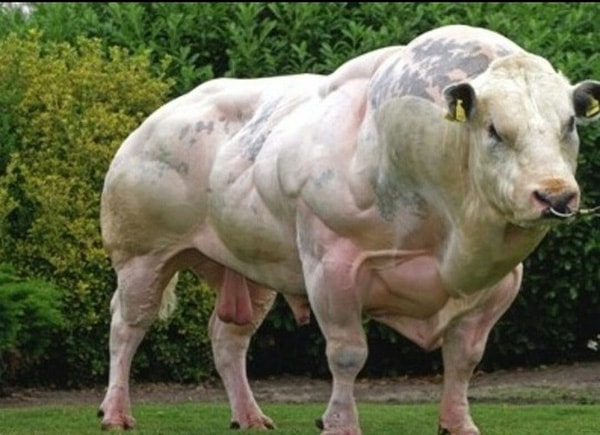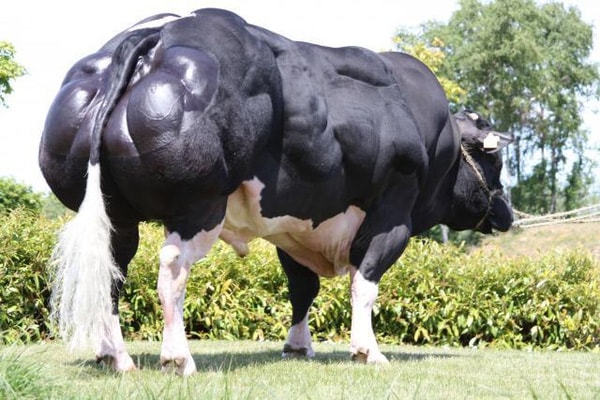'Muscle cows' and the fear of genetically modified foods
Recently, the Belgian Blue cow breed has been causing a lot of controversy because it is a product of genetic modification, producing super milk and super lean meat. What makes consumers wonder is whether there is anything wrong with consuming them?
Blue cattle from Belgium are genetically modified food.
These cows are honored as “super cows”, produced to serve the beef industry. In the very near future, this type of beef will be brought to the market with products that producers and businesses call super milk, super lean products. However, there are still many fears for consumers.
In the genetic structure of the cows has been modified, so they carry a defective gene. And this makes their muscles grow twice as fast as other normal cows.
Thanks to that, a bull will have an average weight of 800 - 1,100 kg, a cow is 600 - 700 kg. Remember! This is just their average weight. There are many other cows that can weigh more. Especially the muscles in the buttocks are extremely developed. Not only does the muscle mass develop more than 40% compared to normal, this breed of cow also produces milk that is extremely rich in protein. To create this "top of the top" breed of cow, researchers had to crossbreed for a long time, selecting from the best individuals, then conducting artificial insemination to preserve the important gene.
 |
However, what few people know is that over-development can put Belgian Blue cattle at risk of myofibroblastic hyperplasia - a disease that causes abnormal muscle growth rather than simply helping the body to swell. This type of beef is currently very popular in the US and some other countries.
In the near future, this super lean, super milky beef will probably be extremely "attractive" to Vietnamese people, especially those who love to eat American beef and American products in general.
"Do not eat genetically modified foods"
Associate Professor Dr. Nguyen Duy Thinh, Institute of Food Technology, University of Science and Technology, said that the above super lean milk cow breed is one of the products in the group of genetically modified foods. Genetically modified foods are the creation of different properties for a certain type of food that can satisfy certain desires of people about the product.
For example, when people want food to be more fragrant, they can insert aromatic gene segments into the genetic structure of animals and plants. Or, when people want to create rice that is not eaten by brown planthoppers without having to spray pesticides, they also have to insert genes that are resistant to brown planthoppers into the rice plant… Here, we can generally say that it is not just genetically modified food but “genetically modified plants, genetically modified animals”.
“In the genetic chain of an organism, there is an extremely complex structure to create a type of food. When the properties of the genes do not change, the food will not change. If there is a change, the food will certainly change as well,” Mr. Thinh affirmed.
 |
The new properties of genetically modified foods today are very diverse. For example, with the same type of rice, people can create a type of rice that can withstand salt, a type that can withstand cold, a type that produces more protein, a type that is more resistant to pests, etc.
This associate professor commented that the US is one of the countries that uses genetically modified technology much more than other countries. The US has proven that genetically modified foods are not harmful, but most countries in the world do not believe it. Therefore, when genetically modified products arrive, many countries do not allow them to be imported or require that they be clearly labeled as genetically modified foods so that consumers can choose for themselves.
Regarding the consumption of Belgian cow milk and meat or any genetically modified food, Associate Professor Dr. Nguyen Duy Thinh affirmed that there is no evidence to confirm this. The most important question now is "Does genetically modified food cause genetic modification in your body?"
 |
Experts say that there is currently no scientifically proven answer, so whether it is harmless or harmful is still controversial, and whatever the answer is, it makes people doubt. In fact, in Vietnam, there are still some shortcomings regarding genetically modified foods such as: importing food without notifying people, and labels not clearly stating that it is genetically modified food, making people not know whether to buy it or not.
“When food is imported, the Ministry of Agriculture and Rural Development must require clear labeling so that people can decide and choose for themselves. It is not important to stop at which country the food is from, whether it is delicious or not, but the important thing is to clearly state that this is genetically modified food. In animal husbandry, farmers are not allowed to arbitrarily introduce genetically modified food into farming without notification,” Mr. Thinh said.
Experts advise that if you do not understand the nature of the problem, you should not eat genetically modified foods. This is the best way to prevent it, do not let it happen. “There is no way to detect whether the food you buy is genetically modified or not, if it is, the only way is to put it in an analyzer. Currently, the world has not yet determined the long-term effects of genetically modified foods. But the best way is for Vietnamese people to prevent it by not knowing. When we are fighting dirty food, cancer-causing food every day... if genetically modified foods also cause changes in the body, where will it go?”, Associate Professor, Dr. Thinh said.
According to Tri Thuc Tre

